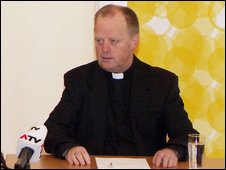BBC News
February 16, 2009
http://news.bbc.co.uk/2/hi/europe/7893453.stm
 |
| Father Wagner's promotion led to protests within the Church |
Less than two weeks after being named as a bishop by the Pope, Father Gerhard Maria Wagner, a controversial Austrian priest, has asked to be relieved of the post.
From Rome the BBC's Vatican correspondent David Willey reports on growing signs of communications failures at the Vatican.
The appointment of Father Wagner, an ultra right-wing priest, to the rank of auxiliary bishop of Linz unleashed a storm of criticism inside the Austrian Church. The bishops of Austria are holding an emergency meeting in Vienna to decide what to do next.
The Vatican says it has received no official communication from Father Wagner announcing that he is standing down.
Critical questions
Did the Pope know, when he signed the official document nominating Father Wagner, that the cleric had told his parishioners that the devastation and loss of life caused by Hurricane Katrina in New Orleans had been divine retribution for the sins of its citizens?
And that the priest had described the Harry Potter novels as "satanic"?
Did the Pope know that Bishop Richard Williamson, an ultra-traditionalist cleric at the centre of another recent and controversial papal decision, had publicly denied the Nazi Holocaust?
Although the Pope may not use Google himself, his team of highly professional advisers could certainly have checked the public record on the internet.
Ironically, the Vatican announced only this month that it is putting papal events onto YouTube in a joint venture with Google in order to increase the evangelical reach and visibility of the Catholic Church.
Did the Pope anticipate the political storm which arose in the Muslim world two years ago after an academic lecture at the university where he used to teach in Germany, in which he equated Islam with violence?
Were correct procedures followed in the appointment of the Austrian bishop?
Austria and the Vatican are linked by a concordat, which means that all senior appointments have to be approved by Vienna as well as Rome.
The answer to all these questions appears to be the same: no.
 |
| The controversy comes ahead of a papal visit to the Holy Land in May |
PR machine
All of which raises another interesting question.
How is it that an organisation predicated upon the infallibility of its teaching should so consistently be failing to keep its internal and external channels of communication functioning smoothly?
What has gone wrong? Is Pope Benedict - final arbiter at the world's longest surviving international organisation - really to blame, or has he once again, as he claimed over his Regensburg speech linking Muslims with violence, simply been "misunderstood"?
The Vatican's PR machine is led by a Jesuit priest, Father Federico Lombardi.
In addition to his job as the head of Vatican Radio, Father Lombardi now wears three additional hats - that of head of Vatican TV, director of the Sala Stampa or the Vatican Press Office, and special media adviser to the "Black Pope" or Superior General of his powerful religious order.
Father Lombardi, seriously overstretched in his work, has been trying valiantly to defend the indefensible: the mutually incompatible aims of Pope Benedict to bring erring sheep back into his fold - even when the sheep in question maintain blatantly anti-Semitic positions - and at the same time to pursue his ongoing dialogue with Israel and the Jews.
What has gone wrong with the management of that usually well-oiled diplomatic machine, the Secretariat of State?
The Vatican's Secretariat of State is roughly the equivalent of a combined Cabinet Office and Foreign Office, in British political-speak.
Urgent shakeup
The Vatican's delicate relationship with Judaism and with the state of Israel has been upset on the eve of a papal visit to the Holy Land in May 2009.
The Williamson affair has also damaged the Vatican's long proclaimed neutrality in the Israeli-Palestinian dispute.
The confusion and ambiguity generated by some of the Pope's recent decisions had not been anticipated by his top advisers in the Secretariat of State.
Cardinal Walter Kasper, head of the Council for Christian Unity, and as such, the Vatican's point man for religious relations with the Jews, has publicly stated that he was not informed in advance about the Pope's decision to hold out his hand in friendship and forgiveness to the renegade traditionalist bishop.
What is the lesson for the future?
That an urgent shakeup inside the structure of internal communications and and external public relations at the Vatican is needed to avoid repetitions of errors that are increasingly being reported in the world's media as papal '"gaffes".
The administration of any normal state demands a system of internal checks and balances.
Although the Holy See claims that it is a unique sovereign organisation - which some might compare more to the court of a mediaeval monarch than a modern city state - the wider global interests of the Church demand an information management system able to cope with the real media world of instant soundbites, blogs and 30-second TV clips.
The complexity of the global environment within which the Vatican operates, poised between theology and realpolitik, demands a more efficient internal information system.
Otherwise Pope Benedict risks frustrating his Church's future efforts at a balanced dialogue with all states and religions.
Any original material on these pages is copyright © BishopAccountability.org 2004. Reproduce freely with attribution.